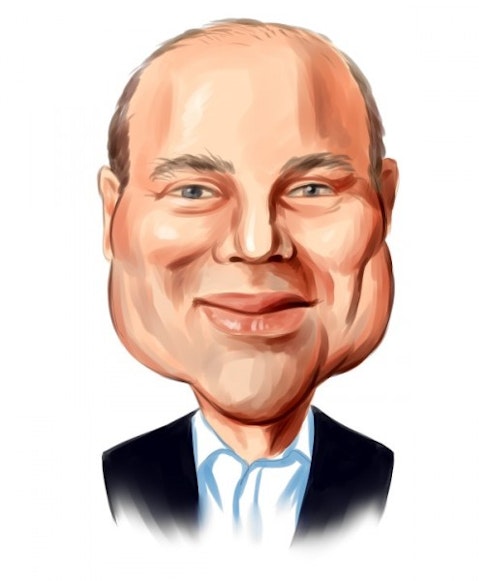In this article, we take a look at the stocks billionaire David Tepper was selling back in the first quarter of 2022 and analyze his moves based on these stocks’ performance over the past six months as of November 19. If you want to skip our detailed discussion about David Tepper’s investment philosophy and portfolio management strategies, then go directly to Was David Tepper Right About These 5 Stocks?.
We prepared the actual contents of this article a few months ago when we analyzed the Q1 portfolio of David Tepper to pick the most important stocks he sold during the period, when the market crash of 2022 was just getting started. We are publishing this article today because it’s always interesting for the readers to analyze how good the so-called “smart money” is when it comes to stock picking. When we look at the stock picks/sells of hedge funds in hindsight, we can better analyze their performance and see whether they were right or wrong.
In this article you will see the stocks David Tepper sold off during the first quarter of 2022. For year stock we have mentioned its performance over the past six months as of November 19.
You will be surprised to see that many of the stocks in the article actually gained a lot of value over the past six months.
At the time of writing we had mentioned analyst ratings for these stocks from famous Wall Street analysts. It’d be interesting for our readers to see how right or wrong were these analysts’ price targets and calls.
So, was David Tepper right in selling in these stocks? Let’s find out in this article. But first, our brief primer on David Tepper and his hedge fund.
Appaloosa Management LP is being managed by David Tepper. Founded in 1993, Appaloosa Management LP specializes in distressed debt. It invests in public equity and fixed income markets globally. David Tepper is known to be opportunistic in his equity investments and often goes for a contrarian view. The hedge fund focuses on equity and debt instruments of distressed companies, bonds, exchange warrants, options, futures, and junk bonds. Appaloosa Management LP has a broad client base of HNIs, corporations, foreign governments, foundations, and other organizations.
David Tepper gained popularity after the market crash of 1987. He booked hefty profits for Goldman Sachs by going long on underlying bonds of financial institutions. In the aftermath of the financial crisis of 2007–2008, David Tepper invested in banking stocks and debt securities. As a result, he made more than $7 billion in profits for his hedge fund.
David Tepper believes in investing according to market conditions and goes long on both growth and value stocks. In early 2020, Appaloosa Management LP purchased positions in Twitter, Inc. (NYSE:TWTR) and QUALCOMM Incorporated (NASDAQ:QCOM). In late 2021, the investment management firm liquidated its positions to book profits. The Gap, Inc. (NYSE:GAP), General Motors Company (NYSE:GM), and Foot Locker, Inc. (NYSE:FL) are some of the stocks in which David Tepper built positions in the fourth quarter of 2021. However, he sold these stocks in the first quarter of 2022.

10. T-Mobile US, Inc. (NASDAQ:TMUS)
No. of Hedge Fund Holders: 91
Performance of TMUS Over the Past 6 Months: +18%
T-Mobile US, Inc. (NASDAQ:TMUS) is an American wireless network operator and the second-largest wireless carrier in the US. The company provides wireless voice and data services in the US and serves as a host network for several mobile virtual network operators.
CEO G Michael Sievert dumped 20,000 shares on 11th May, at an average price of $121.99 per share. Total value came in at $2,439,800.00. On 25th May, Moffett Nathanson reduced the price target on T-Mobile US, Inc. (NASDAQ:TMUS) to $165.00.
At the end of the first quarter of 2022, 91 elite funds were bullish on T-Mobile US, Inc. (NASDAQ:TMUS) against 86 hedge funds in the previous quarter.
ClearBridge Investments, an investment management firm, released its Q4 investor letter and mentioned T-Mobile US, Inc. (NASDAQ:TMUS). Here is what the fund said:
“As mentioned, the communication services sector has come under some pressure, and irrational pricing competition has negatively impacted wireless industry growth and profitability of late, weighing on T-Mobile. Faced with these headwinds, and with pressure from other wireless carriers and cable companies that could cause the company to cede share in subscriber growth in 2022, we exited our position in the fourth quarter.”
9. PulteGroup, Inc. (NYSE:PHM)
No. of Hedge Fund Holders: 27
Performance of PHM Over the Past 6 Months: +0.26%
Headquartered in Atlanta, PulteGroup, Inc. (NYSE:PHM) is one of the largest homebuilders in the US, and it operates in 40 markets across 23 states. It builds single-family detached homes and provides products to entry-level, move-up, and active-adult buyers. The company is also engaged in offering homebuyers mortgage financing and title agency services. Its financial services segment takes care of these services.
In the first quarter of 2022, its net income came in at $455 million, or $1.83 per share, exhibiting favorable operating conditions in the homebuilding industry. The company has realized significant growth in homebuilding revenues, gross margin, net income, and ROE. It has a contract backlog of 19,935 sold homes, valuing $11.5 billion as of 31st March 2022. The average sales price in backlog was $578,000, exhibiting 24% growth year-over-year. Following the close of Q1, Moody’s Investors Service upgraded the company’s senior unsecured notes ratings to Baa2 from Baa3.
Analysts at UBS Group reduced their target price on PulteGroup, Inc. (NYSE:PHM) from $73.00 to $55.00 in a report dated 16th June. They gave a “Buy” rating on the stock. In a report dated 2nd May, Wedbush reduced its target price on the company from $68.00 to $57.00.
As of Q1 2022, 27 hedge funds in the database of Insider Monkey reported owning stakes worth $318.02 million in PulteGroup, Inc. (NYSE:PHM), down from 35 in the preceding quarter worth $788.8 million.
Oakmark Funds, an investment management firm, published its Q1 2022 investor letter and mentioned PulteGroup, Inc. (NYSE:PHM). This is what the fund has to say:
“Pulte (NYSE:PHM) is one of the nation’s largest homebuilders. While demographic tailwinds are expected to support healthy housing demand for years to come, more important to our thesis is the company’s operational transformation over the past decade. Having adopted a more rigorous, returns-driven approach to land acquisition and manufacturing, Pulte now consistently earns returns on equity near the high end of its peer group. We expect the company to generate approximately 15% of its market cap in free cash flow this year, and management is putting that cash to good use by strengthening its balance sheet and returning capital to shareholders. While we recognize that the recent surge in home prices is producing a level of profitability that’s above what we would consider “normal,” we still find the stock attractive relative to our more tempered estimate of mid-cycle earnings.”
8. D.R. Horton, Inc. (NYSE:DHI)
No. of Hedge Fund Holders: 52
Performance of DHI Over the Past 6 Months: +18%
D.R. Horton, Inc. (NYSE:DHI) is the largest homebuilding company when measured by the number of homes closed. The company constructs and sells homes through its operating divisions in 98 markets across 31 states.
The company has reported that its net income for the second quarter of fiscal 2022 increased 59% to $4.03 per diluted share against $2.53 per diluted share in Q2 of fiscal 2021. Its net sales orders for Q2 decreased 10% to 24,340 homes and grew 10% in value to $9.7 billion in comparison to 27,059 homes and $8.8 billion in the same quarter of the previous year. In fiscal 2022, consolidated revenues are expected to lie between $35.3 billion-$36.1 billion.
D.R. Horton, Inc. (NYSE:DHI) was in 52 hedge fund portfolios at the end of the first quarter of 2022, compared to 54 funds in the preceding quarter. In a research report dated 17th June, analysts at Wells Fargo & Company reduced their price target on shares of D.R. Horton, Inc. (NYSE:DHI) from $86.00 to $73.00. They gave an “Overweight” rating on the stock.
A fall in consumer confidence, higher interest rates, and a trend change in the number of building permits are the near-term headwinds for D.R. Horton, Inc. (NYSE:DHI). Most real estate purchases are funded through mortgages. With the US Fed increasing interest rates, mortgages are becoming expensive. This can result in lower demand for houses.
Third Avenue Management, an investment management firm, released a first-quarter 2022 investor letter. Here is what Third Avenue Management stated about D.R. Horton, Inc. (NYSE:DHI):
“Outside of these additions, the Fund also sold “out-of-the-money” put options on the common stock of D.R. Horton, Inc. (“DR Horton”)-the largest homebuilder in the U.S. that accounted for nearly 1 out 9 new homes sold in the U.S. last year. Having followed the company for years, Fund Management can say without hesitation that DR Horton is an incredibly efficient builder focused on delivering quality product at the entry-level price point (its average selling price was less than $325,000 last year) with leading positions in key Sunbelt markets including Dallas, Houston, Austin, Atlanta, and Phoenix.
While the near-term outlook for DR Horton is somewhat uncertain given mortgage rate and supply chain volatility, the medium-to-long-term prospects for volume-based homebuilders with super-strong balance sheets and scale advantages seem promising (such as DR Horton and Lennar Corp.) in Fund Management’s view. This is especially the case when considering that:
-
Residential inventories are at record- low levels in most major markets whether gauged by “month’s supply” or aggregate units available,
-
Demand for single- family residences is accelerating as the largest generation in U.S. history (the “millennial cohort”) enters its prime home buying years and desires more space not only due to “life events” but also “remote” and “hybrid” working arrangements, and
-
Significant inflation in rental rates for multi-family units in urban areas has left the rent-to-own proposition for single- family homes in suburban areas in a compelling range…” (Click here to see the full text)”
7. DICK’S Sporting Goods, Inc. (NYSE:DKS)
No. of Hedge Fund Holders: 31
Performance of DKS Over the Past 6 Months: +40%
DICK’S Sporting Goods, Inc. (NYSE:DKS) is a leading omni-channel sporting goods retailer which offers an extensive assortment of authentic, high-quality sports equipment, apparel, footwear, and accessories.
On 25th May, Robert W. Baird reduced their target price on DICK’S Sporting Goods, Inc. (NYSE:DKS) from $115.00 to $85.00, giving a “Neutral” rating on the stock. However, Barclays analyst Adrienne Yih is optimistic about the stock after attending management meetings. She thinks that post-COVID enhanced margin structure, strong market position, and nationwide omnichannel footprint are expected to lend support.
Insider Monkey’s data shows that 31 hedge funds held stakes at the end of the first quarter worth $1.14 billion. At the end of the previous quarter, 37 hedge funds held stakes in the company.
Baron Funds, an asset management firm, released a first-quarter 2022 investor letter in which it mentioned DICK’S Sporting Goods, Inc. (NYSE:DKS). Here is what the fund said:
“Dick’s Sporting Goods, Inc. was the first stock Michael recommended to us shortly after he joined Baron Capital in 2003. Dick’s share price has since increased about nine-fold. Unfortunately, we sold our investment in Dick’s about six years ago and, although it was a successful investment, we did not realize the full benefit of Michael’s recommendation. We sold too soon because I was concerned that competition from internet retailers would have a permanent negative impact on Dick’s stores’ profitability. I was wrong. Dick’s stock price so far has about doubled after we sold…and its prospects have brightened!
We sold even though we considered Ed Stack, Dick’s Chairm”n and CEO, a terrific retailer, a great entrepreneur and a special person. Ed had built Dick’s from three bait and tackle stores his dad started into a uniquely positioned, nationwide chain of 730 sporting goods stores. In fact, Dick’s is now the largest nationwide sporting goods chain. Ed had purchased the three bait and tackle stores, the foundation of Dick’s business, from his dad. Ed’s mother loaned him the money to buy his dad’s stores! I’m not exactly sure what that signifies. But it may have something to do with Carl Icahn’s proclamation that “everything I have is for sale except my children…and maybe my wife.”
Ed and his newly appointed CEO Lauren Hobart visited us last month. Ed asked for the meeting to introduce us to Lauren, as well as to discuss the prospects for Dick’s new, large format stores with attached outdoor, student athletic fields. Lauren then described how well its new format stores were doing in two smaller communities. We also spoke about the successes of Dick’s omni-channel retailing efforts and how desirable Dick‘s stores have become to shopping centers trying to lure shoppers to return to their malls.”
6. CarMax, Inc. (NYSE:KMX)
No. of Hedge Fund Holders: 27
Performance of KMX Over the Past 6 Months: -28%
CarMax, Inc. (NYSE:KMX) offers a broad selection of quality used vehicles and related products and services at competitive prices. It was formed in the year 1993 as a unit of Circuit City and, in late 2002, it was spun off into an independent company.
CarMax, Inc. (NYSE:KMX) was in 27 hedge fund portfolios at the end of the first quarter of 2022, compared to 35 funds in the previous quarter. On 7th June, JPMorgan Chase & Co. reduced their price objective on the shares of CarMax, Inc. (NYSE:KMX) from $110.00 to $105.00.
Giverny Capital, an asset management firm, released its first-quarter 2022 investor letter and mentioned CarMax, Inc. (NYSE:KMX). Here is what the fund said:
“As for our other big decliners, Carmax is the country’s largest seller of used autos. Last year, amid supply chain shortages, production of new cars slowed. This created huge demand for used cars, and prices surged. Carmax opted to hold its gross profit dollars per vehicle flat in this environment, which benefits customers. If historically Carmax sold a used car for an average price of $21,000 with a $2,100 gross profit, in 2022 it sold used cars for an average price of $29,000 with a $2,200 gross profit. This decision was not well-received by Wall Street. In fairness to the critics, Carmax faced inflationary costs in wages and other areas that may have justified charging higher mark-ups. Still, Carmax sold 23% more vehicles in 2021 than in 2020, earned a lot more money and grew its market share to 4% of all transactions for used cars under 10 years old, from 3.5% a year ago. Presumably, the decision to price responsibly won it some customer goodwill that will result in future business.
Recently, those very high prices for used cars have caused demand to wane. Carmax may sell fewer cars in 2022 than in 2021, which unnerves investors. But it continued to gain market share in early 2022 and still generate healthy profits. Carmax has become quite inexpensive relative to its proven ability to grow profitably in an enormous industry. A 4% market share leaves a lot of room for growth. We added modestly to our position during the first quarter.”
Click to continue reading and see Was David Tepper Right About These 5 Stocks?.
Suggested articles:
Disclosure: None. Was David Tepper Right About These 10 Stocks? is originally published on Insider Monkey.





